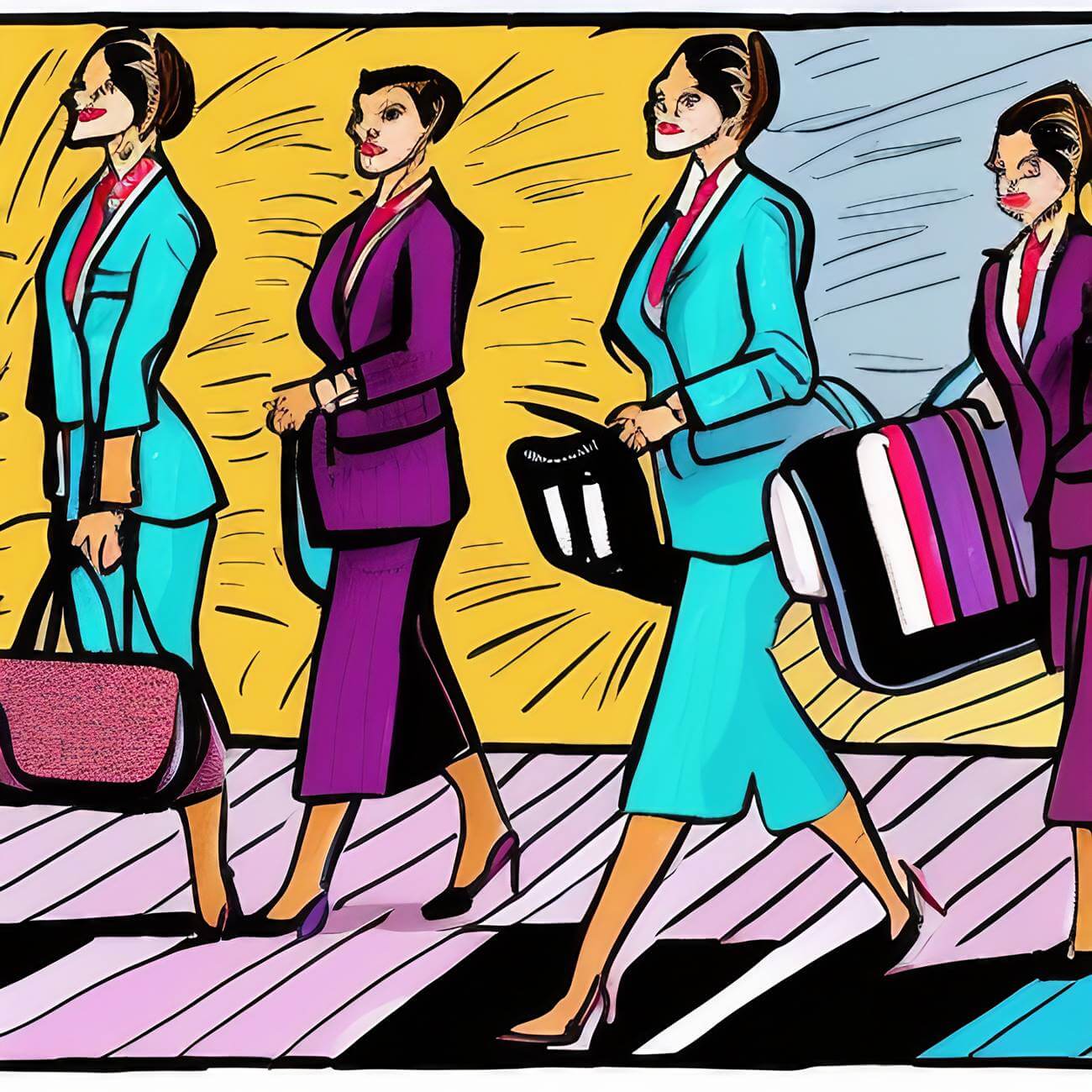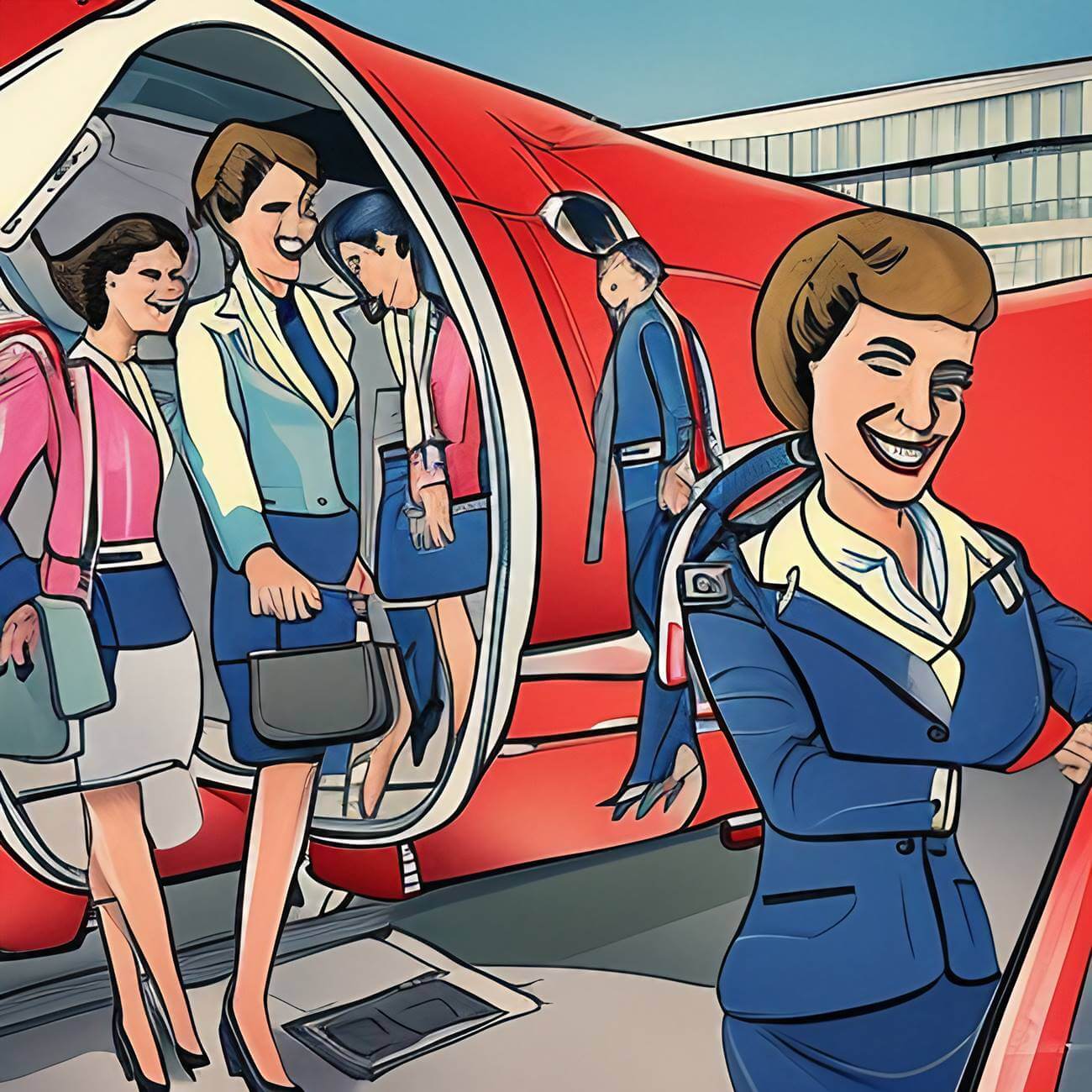If you have ever wanted to be an airline cabin crew member, this is the perfect opportunity. You will get endless travel opportunities and experience different cultures while also interacting with various nationalities of people! The job offers so much more than just a paycheck; it’s really about living life at its fullest potential. In many cases, these perks have led to people saying that it is a temporary job and it will be done in no time. Before you know it half of your career has passed by and you are still doing the same thing!
Also Read: Cabin Crew Layover – Maximizing Hotel Layovers as a Flight Attendant
But what comes after the life of a flight attendant? Whether you are ready to progress to another career, change your base country, or simply just want to move on, how do you know what to do next? For some, the thought of leaving this amazing job is unthinkable. After all, it has given them everything they ever wanted! If you are content with your current situation and have no desire to leave, then that is great. But for those who feel like they need a change, here are some ideas of what you can do next.
Contents

Brand Representative of an Airline
The grass is not always greener on the other side, and that’s especially true when it comes to flight attendants who try to leave the job. It can be difficult to get hired by another airline, and even if you are able to do so, you may start at a lower pay rate than you were making before.
Additionally, if you have been a flight attendant for more than a few years, it can be hard to transition into a different career. Your experience may not be transferable to another field, and you may find yourself struggling to find work that is both interesting and pays well.
Also Read: How to Become a VVIP Flight Attendant
Customer Service Focus
One of the best things about being a flight attendant is the customer service focus. If you are thinking about leaving your job as a flight attendant, consider how this skill set can be transferable to another career. There are many jobs that require excellent customer service skills, and you may find that your experience as a flight attendant gives you an edge in these roles.
Some examples of careers that may be a good fit for someone with customer service experience include:
- VIP Flight Attendant
- Retail Sales Associate
- Bank Teller
- Waitress or waiter
- Customer Service Representative
- Hotel Front Desk Officer
Read more: 15 Must-Have Qualities of Cabin Crews
Working under Pressure
Another skill that you develop as a flight attendant is an ability to work well under pressure. If you are thinking about leaving your job, consider how this skill can be transferable to another career. There are many jobs that require the ability to work well under pressure, and you may find that your experience as a flight attendant gives you an edge in these roles.
Some examples of careers that may be a good fit for someone who is able to work well under pressure include:
- Emergency medical Technician
- Firefighter
- Police Officer
- Paramedic
- Nurse
These are just a few examples of careers that may be a good fit for someone with customer service or working under pressure experience. With a little research, you may be surprised at the number of options available to you.
Communication and Teamwork
As a flight attendant, you are part of a team that works together to ensure the safety and comfort of passengers. Your communication and teamwork skills can be very desirable and useful in other fields of work. You may then find that your experience as a flight attendant gives you an edge in these roles.
Some examples of careers that may be a good fit for someone with teamwork and communication experience include:
- Teacher
- Salesperson
- Manager
- Customer Service Representative
- Event Planner
Safety and First Aid
Safety is everything when you are a flight attendant. The cabin crew is trained to deal with any form of medical emergency on board a plane such as someone having a stroke or giving birth. Keep in mind, flights don’t necessarily do an emergency landing or return back to field due to a serious medical situation. Cabin crews are trained to manage this scenario as best as possible.
They also learn how to handle safety emergency situations such as by putting out fires that can be caused by an electrical problem with the galley ovens, for example. All these skillset you’ll learn, practice and adopt in real-life scenarios are definitely some of the most useful skills to learn as a flight attendant.
Fares & Ticketing Platform
The person in charge of the ticketing and fares department is responsible for making sure that all passengers are able to purchase tickets and that they are aware of any changes in fare prices. This individual also works with the marketing team to develop promotional fares and discounts.
As the one in charge of this department, you will need to have excellent customer service skills as you will be working closely with passengers. You should also be able to work well under pressure as you will need to juggle multiple tasks at any given time. Excellent communication and teamwork skills are also a must as you will be working closely with other members of the team.
Some examples of careers that may be a good fit for you:
- Travel Agent
- Airport Ticketing Agent
- Customer Service Representative
- Ground Staff
Other Skills that you Develop as a Flight Attendant
- Resolving conflicts – The cabin crew is an expert in conflict resolution, and having to deal with issues on board an airplane can be problematic. They want the situation resolved as quickly and efficiently so disruptive events don’t arise.
- Cultural Adaptability and Awareness – Cabin Crews also develop cultural awareness when working among many different crews and passengers from around the world who may not all share similar perspectives or values due to their differences. Eventually cabin crews learn to smoothly navigate different types of conversations with different cultures and backgrounds of people.
- Fitness – Cabin Crews have to be fit for flying and maintain good health all year round. The job is both physically and mentally demanding so having a healthy lifestyle is definitely a top priority so they can do the job well and also have fun while traveling.
Other Ideas on What to Do Next
1. Start your own business: If you have always wanted to be your own boss, now is the time to do it! There are many online businesses that you can start with little to no capital. All you need is a great idea and some determination.
2. Go back to school: Use your time as a flight attendant to save up for school. Whether you want to get a degree or learn a new trade, this is the perfect time to do it.
3. Travel the world: One of the best things about being a flight attendant is that you get to travel to so many different places. If you want to continue traveling, there are many ways to do it. You can become a travel blogger, start a travel planning business, or even become a professional traveler.

Frequently Asked Questions
Below are some of the most common questions applicants have when applying for the role of flight attendant:
1. Is it hard to become a Flight Attendant?
No, it is not hard to become a flight attendant. There are many schools that offer training, and the requirements to become a flight attendant are not as stringent as they used to be. However, it is important to remember that being a flight attendant is a demanding job, and it is not for everyone.
2. What are the requirements to become a Flight Attendant?
The requirements to become a flight attendant vary by airline, but most airlines require that you be at least 21 years of age and have a high school diploma or equivalent. You will also need to pass a physical examination and drug test, and you must be able to swim. Some airlines also require that you have fluency in another language.
3. What are the benefits of being a Flight Attendant?
There are many benefits to being a flight attendant, including free or discounted travel, hotel stays, and meals. Flight attendants also receive training in safety and first aid, which can be beneficial in other careers.
4. What are the drawbacks of being a Flight Attendant?
The biggest drawback of being a flight attendant is the irregular schedule. Flight attendants may have to work weekends, holidays, and overnight shifts. They also may be away from home for days or weeks at a time. Additionally, flight attendants must be able to work under pressure and handle difficult situations.
5. Is the job of a Flight Attendant stressful?
Being a flight attendant can be stressful at times due to long hours, irregular schedules, and dealing with difficult passengers. However, many flight attendants find that the reward of traveling and seeing different places outweighs any stress associated with the job. Additionally, airlines provide training for their flight attendants to help them cope with stressful situations.
Summary
If you’ve been lucky enought to get a job as a flight attendant, then you have a great opportunity ahead of you! This job can be both mentally and physically demanding, so make sure to stay fit and healthy.
However, in the event that you are thinking about resigning from the job, make sure to plan beforehand and explore your options. You just need to set a timeline until when you wish to keep flying, and then upgrade your skills so you can have more choices if ever you decided to take a different career path.